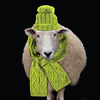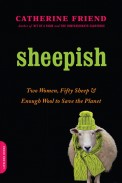Arts & Entertainment
A lovable wooly tale
Lesbian leaves city life behind to run sheep farm

When you had trouble with insomnia the other night, it seemed like nothing would lull you back to sleep. Warm milk tasted bad. That previously boring book on your bedside table suddenly turned intriguing. Even infomercials held your interest, so you started counting sheep.
Then you got to wondering — why sheep? Why not count cows or dogs? Is it because sheep are, well, like sheep? Author Catherine Friend wondered that herself because she has a flock of them on her Minnesota farm, and in her new book “Sheepish,” she writes of the good and the ba-a-a-ad, the wild and the wooly.
Though her grandmother raised them on a Montana ranch, Catherine Friend had little experience with sheep – that is, until her partner, Melissa, wistfully admitted her dream of owning a farm and raising the critters.
And thus it came to pass that Catherine had a little lamb.
Fifteen years later, Friend has morphed from City Girl to Backup Farmer. It hasn’t been a gentle-as-a-lamb transformation, but Friend now appreciates her flock.
Ovines have a long history in North America, she says. Sheep were shipped to the New World in 1609 and within 60 years, there were more than 100,000 sheep on our shores. English lawmakers tried to outlaw the sale of wool but colonists managed to outwit the Brits and wool gathering became patriotic.
Sheep “show up everywhere in our language,” Friend says, and they’re good for supper, of course, but it’s their wool that she fell in love with.
Because of the price of fleece, she says, many farmers shear their sheep and throw the wool away. Most small operations won’t get rich on their wool, but Friend discovered the rich colors of wool dyes. Although she first makes fun of “fiber freaks” (knitters who bleat rhapsodically about wool fibers), she couldn’t wait to see what “her sheep” produced.
But life on the farm isn’t always laid back. Where there’s livestock, “there’s dead stock,” says Friend. Animals, like humans, don’t always do what you want them to do; they’re never born at convenient times; and sometimes, they get sick. When these things happen, even Backup Farmers do their best for their animals – even if it means giving those animals up.
Imagine a serene pasture filled with contented (nameless) sheep. Then imagine a reluctant shepherdess at the helm, add llamas, cats and dogs, chickens and a peacock, frisky calves, knitters, and Elvis, and you’ve got a good yarn called “Sheepish.”
Author Catherine Friend gives her readers a sense of the bucolic. She lulls us into total serenity with her poetic descriptions of her flock and then she knocks us upside the funny bone with asides that are dyed-in-the-wool hilarious. In between, Friend has a way of bringing tears to our eyes before she pulls us back to the funny farm.
If a taste of the country is what you crave this summer, if you’re a farmer or a wannabe, a knitter, or just love a wooly tale, here’s a book you’ll enjoy. “Sheepish” is perfect for ewe.
‘Sheepish: Two Women, Fifty Sheep & Enough Wool to Save the Planet’
By Catherine Friend
$16
263 pages

Team DC, the umbrella organization for LGBTQ-friendly sports teams and leagues in the D.C. area, held its annual Night of Champions Awards Gala on Saturday, April 20 at the Hilton National Mall. The organization gave out scholarships to area LGBTQ student athletes as well as awards to the Different Drummers, Kelly Laczko of Duplex Diner, Stacy Smith of the Edmund Burke School, Bryan Frank of Triout, JC Adams of DCG Basketball and the DC Gay Flag Football League.
(Washington Blade photos by Michael Key)




















The 2024 National Cannabis Festival was held at the Fields at RFK Stadium on April 19-20.
(Washington Blade photos by Michael Key)
















Covering the @NatlCannaFest at RFK Stadium for @WashBlade . Stop by the LGBTQ+ booth and pick up a paper if you are here. pic.twitter.com/is7hnsaPns
— Michael Patrick Key (@MichaelKeyWB) April 20, 2024
Theater
‘Amm(i)gone’ explores family, queerness, and faith
A ‘fully autobiographical’ work from out artist Adil Mansoor

‘Amm(i)gone’
Thorough May 12
Woolly Mammoth Theatre
641 D St., N.W.
$60-$70
Woollymammoth.net
“Fully and utterly autobiographical.” That’s how Adil Mansoor describes “Amm(i)gone,” his one-man work currently playing at Woolly Mammoth Theatre.
Both created and performed by out artist Mansoor, it’s his story about inviting his Pakistani mother to translate Sophocles’s Greek tragedy “Antigone” into Urdu. Throughout the journey, there’s an exploration of family, queerness, and faith,as well as references to teachings from the Quran, and audio conversations with his Muslim mother.
Mansoor, 38, grew up in the suburbs of Chicago and is now based in Pittsburgh where he’s a busy theater maker. He’s also the founding member of Pittsburgh’s Hatch Arts Collective and the former artistic director of Dreams of Hope, an LGBTQ youth arts organization.
WASHINGTON BLADE: What spurred you to create “Amm(i)gone”?
ADIL MANSOOR: I was reading a translation of “Antigone” a few years back and found myself emotionally overwhelmed. A Theban princess buries her brother knowing it will cost her, her own life. It’s about a person for whom all aspirations are in the afterlife. And what does that do to the living when all of your hopes and dreams have to be reserved for the afterlife?
I found grant funding to pay my mom to do the translation. I wanted to engage in learning. I wanted to share theater but especially this ancient tragedy. My mother appreciated the characters were struggling between loving one another and their beliefs.
BLADE: Are you more director than actor?
MANSOOR: I’m primarily a director with an MFA in directing from Carnegie Mellon. I wrote, directed, and performed in this show, and had been working on it for four years. I’ve done different versions including Zoom. Woolly’s is a new production with the same team who’ve been involved since the beginning.
I love solo performance. I’ve produced and now teach solo performance and believe in its power. And I definitely lean toward “performance” and I haven’t “acted” since I was in college. I feel good on stage. I was a tour guide and do a lot of public speaking. I enjoy the attention.
BLADE: Describe your mom.
MANSOOR: My mom is a wonderfully devout Muslim, single mother, social worker who discovered my queerness on Google. And she prays for me.
She and I are similar, the way we look at things, the way we laugh. But different too. And those are among the questions I ask in this show. Our relationship is both beautiful and complicated.
BLADE: So, you weren’t exactly hiding your sexuality?
MANSOOR: In my mid-20s, I took time to talk with friends about our being queer with relation to our careers. My sexuality is essential to the work. As the artistic director at Dreams of Hope, part of the work was to model what it means to be public. If I’m in a room with queer and trans teenagers, part of what I’m doing is modeling queer adulthood. The way they see me in the world is part of what I’m putting out there. And I want that to be expansive and full.
So much of my work involves fundraising and being a face in schools. Being out is about making safe space for queer young folks.
BLADE: Have you encountered much Islamophobia?
MANSOOR: When 9/11 happened, I was a sophomore in high school, so yes. I faced a lot then and now. I’ve been egged on the street in the last four months. I see it in the classroom. It shows up in all sorts of ways.
BLADE: What prompted you to lead your creative life in Pittsburgh?
MANSOOR: I’ve been here for 14 years. I breathe with ease in Pittsburgh. The hills and the valleys and the rust of the city do something to me. It’s beautiful, it’ affordable, and there is support for local artists. There’s a lot of opportunity.
Still, the plan was to move to New York in September of 2020 but that was cancelled. Then the pandemic showed me that I could live in Pittsburgh and still have a nationally viable career.
BLADE: What are you trying to achieve with “Amm(i)gone”?
MANSOOR: What I’m sharing in the show is so very specific but I hear people from other backgrounds say I totally see my mom in that. My partner is Catholic and we share so much in relation to this.
I hope the work is embracing the fullness of queerness and how means so many things. And I hope the show makes audiences want to call their parents or squeeze their partners.
-

 District of Columbia5 days ago
District of Columbia5 days agoNew D.C. LGBTQ+ bar Crush set to open April 19
-

 South America3 days ago
South America3 days agoDaniel Zamudio murderer’s parole request denied
-

 Opinions5 days ago
Opinions5 days agoOpen or closed? No, not your bar tab
-

 Maryland4 days ago
Maryland4 days agoMontgomery County police chief discusses arrest of trans student charged with planned school shooting







